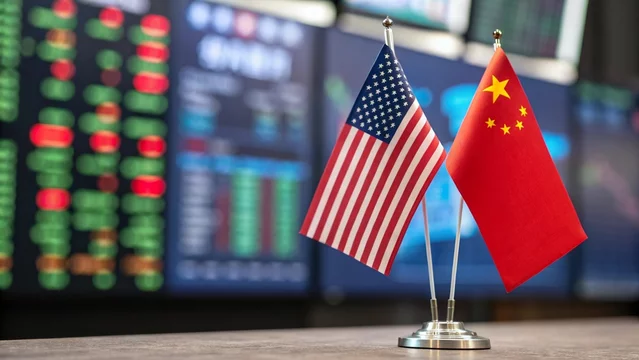Yuan Hits 17-Year Low Amid Trade War
China's yuan hits a 17-year low against the US dollar amid escalating trade war tensions, with the onshore yuan closing at 7.3498 per dollar.
.jpg) Chinese banknotes stacked together, showcasing multiple one-hundred yuan notes on a flat surface - Numerous one-hundred yuan banknotes are spread out, creating a vibrant display of Chinese currency on a flat surface Photo By (@Eric Prouzet) (Unsplash)
Chinese banknotes stacked together, showcasing multiple one-hundred yuan notes on a flat surface - Numerous one-hundred yuan banknotes are spread out, creating a vibrant display of Chinese currency on a flat surface Photo By (@Eric Prouzet) (Unsplash)SINGAPORE/HONG KONG, April 9 - China's yuan has hit its weakest level in over 17 years, closing at 7.3498 per US dollar, as the escalating trade war between the world's two largest economies rattles currency markets. The offshore yuan fell to a record low overnight, further exacerbating the decline.
The yuan's decline is attributed to the trade war tensions, with US President Donald Trump's "reciprocal" tariffs on dozens of countries, including massive 104% duties on Chinese goods, taking effect on Wednesday. In response, China's top leaders are set to meet to discuss measures to boost the economy and stabilize capital markets.
Despite the tariff pressure, China's central bank is working to prevent sharp yuan declines. The People's Bank of China has asked major state-owned banks to reduce US dollar purchases and has set the midpoint rate at 7.2066 per dollar, the lowest since September 11, 2023. Chinese state-owned banks were also selling dollars in the onshore spot market to slow the pace of yuan declines.
The onshore yuan finished the domestic trading session at 7.3498 per dollar, its weakest close since December 2007. The offshore yuan pared losses and climbed about 0.7% to 7.3769 yuan per dollar in Asian trade after hitting a record low of 7.4288 overnight. Both the onshore and offshore yuan have fallen more than 1% so far this month, leaving them weaker since the start of the year.
According to Capital Economics, the latest US tariff hikes could reduce China's GDP by 1.0-1.5% depending on the extent of rerouting exports through other countries. This could lead to a further expansion in fiscal support to mitigate the economic impact.
US President Donald Trump accused China of manipulating its currency to offset the impact of tariffs. A weaker yuan would make exports cheaper and alleviate some pressure on China's trade and the broader economy, but a sharp decline could fuel unwanted capital outflow pressure and risk financial stability, economists said.







Conversation